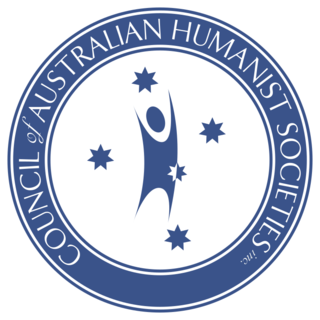Related Research Articles
Secular humanism is a philosophy, belief system, or life stance that embraces human reason, logic, secular ethics, and philosophical naturalism, while specifically rejecting religious dogma, supernaturalism, and superstition as the basis of morality and decision-making.
Universalism is the philosophical concept and a theological concept within Christianity that some ideas have universal application or applicability.

Unitarian Universalism is a liberal religious movement characterized by a "free and responsible search for truth and meaning". Unitarian Universalists assert no creed, but instead are unified by their shared search for spiritual growth. Unitarian Universalists do not have an official, unified corpus of sacred texts. Unitarian Universalist congregations include many atheists, agnostics, deists, and theists; there are churches, fellowships, congregations, and societies around the world.

Morality is the categorization of intentions, decisions and actions into those that are proper, or right, and those that are improper, or wrong. Morality can be a body of standards or principles derived from a code of conduct from a particular philosophy, religion or culture, or it can derive from a standard that is understood to be universal. Morality may also be specifically synonymous with "goodness", "appropriateness" or "rightness".
Religious humanism or ethical humanism is an integration of humanist philosophy with congregational rites and community activity that center on human needs, interests, and abilities. Religious humanists set themselves apart from secular humanists by characterizing the nontheistic humanist life stance as a non-supernatural "religion" and structuring their organization around a congregational model.

The perennial philosophy, also referred to as perennialism and perennial wisdom, is a school of thought in philosophy and spirituality that posits that the recurrence of common themes across world religions illuminates universal truths about the nature of reality, humanity, ethics, and consciousness. Some perennialists emphasize common themes in religious experiences and mystical traditions across time and cultures; others argue that religious traditions share a single metaphysical truth or origin from which all esoteric and exoteric knowledge and doctrine have developed.
This index of ethics articles puts articles relevant to well-known ethical debates and decisions in one place - including practical problems long known in philosophy, and the more abstract subjects in law, politics, and some professions and sciences. It lists also those core concepts essential to understanding ethics as applied in various religions, some movements derived from religions, and religions discussed as if they were a theory of ethics making no special claim to divine status.
Nontheism or non-theism is a range of both religious and non-religious attitudes characterized by the absence of espoused belief in the existence of God or gods. Nontheism has generally been used to describe apathy or silence towards the subject of gods and differs from atheism, or active disbelief in any gods. It has been used as an umbrella term for summarizing various distinct and even mutually exclusive positions, such as agnosticism, ignosticism, ietsism, skepticism, pantheism, pandeism, transtheism, atheism, and apatheism. It is in use in the fields of Christian apologetics and general liberal theology.
Humanist Manifesto is the title of three manifestos laying out a humanist worldview. They are the original A Humanist Manifesto, the Humanist Manifesto II (1973), and Humanism and Its Aspirations: Humanist Manifesto III (2003). The original manifesto originally arose from religious humanism, though secular humanists also signed.
Humanism and Its Aspirations is the most recent of the Humanist Manifestos, published in 2003 by the American Humanist Association (AHA). The newest one is much shorter, listing six primary beliefs, which echo themes from its predecessors:

The Ethical movement is an ethical, educational, and religious movement established in 1877 by the academic Felix Adler (1851–1933). The premise of Ethical Culture is that honoring and living in accordance with a code of ethics is required to live a meaningful life and for making the world a better place for all people.

Christian ethics, also known as moral theology, is a multi-faceted ethical system. It is a virtue ethic, which focuses on building moral character, and a deontological ethic which emphasizes duty. It also incorporates natural law ethics, which is built on the belief that it is the very nature of humans – created in the image of God and capable of morality, cooperation, rationality, discernment and so on – that informs how life should be lived, and that awareness of sin does not require special revelation. Other aspects of Christian ethics, represented by movements such as the social Gospel and liberation theology, may be combined into a fourth area sometimes called prophetic ethics.
Secular ethics is a branch of moral philosophy in which ethics is based solely on human faculties such as logic, empathy, reason or moral intuition, and not derived from belief in supernatural revelation or guidance—a source of ethics in many religions. Secular ethics refers to any ethical system that does not draw on the supernatural, and includes humanism, secularism and freethinking. A classical example of literature on secular ethics is the Kural text, authored by the ancient Indian philosopher Valluvar.

The Council of Australian Humanist Societies (CAHS) is an umbrella organisation for Australian humanist societies. It was founded in 1965. It is affiliated with Humanists International. The official symbol of CAHS is the Happy Human.
The Rationalist Society of Australia (RSA) promotes the interests of rationalists nationally in Australia. Originally formed as the Victorian Rationalist Association, the society originated in a meeting of freethinkers in the University of Melbourne in 1906. It is the operational arm of the rationalist movement in Australia.
Humanism is a philosophical stance that emphasizes the individual and social potential, and agency of human beings, whom it considers the starting point for serious moral and philosophical inquiry.
Universalism refers to religious, theological, and philosophical concepts with universal application or applicability. Universalists may emphasise the universal principles of most religions.
Secular morality is the aspect of philosophy that deals with morality outside of religious traditions. Modern examples include humanism, freethinking, and most versions of consequentialism. Additional philosophies with ancient roots include those such as skepticism and virtue ethics. Greg M. Epstein also states that, "much of ancient Far Eastern thought is deeply concerned with human goodness without placing much if any stock in the importance of gods or spirits." An example is the Kural text of Valluvar, an ancient Indian theistic poet-philosopher whose work remains secular and non-denominational. Other philosophers have proposed various ideas about how to determine right and wrong actions. An example is Immanuel Kant's categorical imperative.
Articles related to philosophy of religion include:
Austin Dacey is an American philosopher, writer, and human rights activist whose work concerns secularism, religion, freedom of expression, and freedom of conscience. He is the author of The Secular Conscience: Why Belief Belongs in Public Life, The Future of Blasphemy: Speaking of the Sacred in an Age of Human Rights, and a 2006 New York Times op-ed entitled "Believing in Doubt," which criticized the ethical views of Pope Benedict. He is a representative to the United Nations for the International Humanist and Ethical Union and the creator and director of The Impossible Music Sessions.
References
- 1 2 Hans Küng. "Global Ethic and Human Responsibilities". Markkula Center for Applied Ethics, Santa Clara University (2007). Retrieved 2007-06-03.
- ↑ Amitabh Pal (January 2006). "The Dalai Lama Interview". The Progressive (January 2006). Retrieved 2007-06-03.
- ↑ "Natural Law". The Internet Encyclopedia of Philosophy (2006). Retrieved 2007-06-03.
- ↑ Mark I. Vuletic. "Is Atheism Consistent With Morality?". Modern Documents, The Secular Web Library (2001). Retrieved 2007-06-03.
- ↑ "Welcome to the School of Economic Science". School of Economic Science, www.schooleconomicscience.org. Retrieved 2007-06-03.
- ↑ Victoria Macdonald. "School abuse inquiry". Channel 4 News - World (14 Mar 2006). Archived from the original on 2007-05-29. Retrieved 2007-06-03.
- ↑ "A Free and Responsible Search for Truth and Meaning". A Sermon by the Rev. James R. Bridges. Archived from the original on February 12, 2006. Retrieved 2007-06-03.
- ↑ "The 3 Objects of the Sufi Movement". Hazrat Pir-o-Murshid Inayat Khan, Sufi Ruhaniat International (1956-2006). Archived from the original on 2007-03-07. Retrieved 2007-06-03.